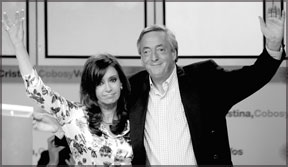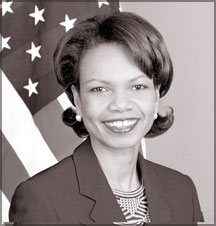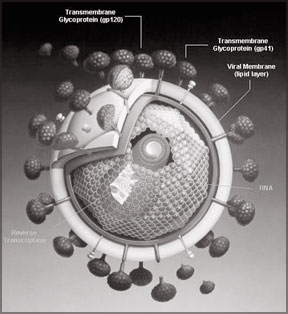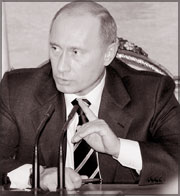
Keeping politics in the family
Cristina Fernandez de Kirchner has secured victory in Argentina's
presidential election, after being hand-picked by her popular husband
President Nestor Kirchner as the Peronist Party candidate.
Argentine law prevents a president serving more than two consecutive
terms, but a husband-and-wife team could alternate in power if they
continue to be supported. Mrs Kirchner's political ambitions have earned
her comparisons with other wives who had designs on their husband's
careers. Below are a selection of those couples who tried to keep
politics in the family, along with those who fell out over it.
Hillary and Billl Clinton
Hillary and Bill Clinton have spent many years as a political team.
According to Hillary's biography, not long after they got together, they
hatched a long-term political plan that, if successful, would give them
eight years each in the White House.
 During his first campaign, Mr Clinton routinely invoked his wife,
joking that voters would get "two for one" if they elected him. Indeed,
when he was elected, he gave his wife an unprecedented role for a first
lady, by putting her in charge of his health-care reform. Both the
scheme and Hillary's appointment were widely criticised, and the reform
failed to pass through Congress in 1993. During his first campaign, Mr Clinton routinely invoked his wife,
joking that voters would get "two for one" if they elected him. Indeed,
when he was elected, he gave his wife an unprecedented role for a first
lady, by putting her in charge of his health-care reform. Both the
scheme and Hillary's appointment were widely criticised, and the reform
failed to pass through Congress in 1993.
Mrs Clinton continued to play a significant role as first lady,
actively promoting education and childcare. She struck out on her own in
1999 when she ran for the Senate.
The issue of a spouse's role has resurfaced during the 2008 US
election campaign.
Harnessing her husband's political skills and experience, Mrs Clinton
has said that she would give her husband a job as a roaming ambassador
to the world to boost America's image abroad.
"I can't think of a better cheerleader for America than Bill Clinton.
Can you?" she said in Iowa while campaigning. She added that she was
very lucky that he had so much experience.
However, the former president recently said he would take a back seat
in the White House should Hillary be elected president. In an interview
with the BBC, he said he would not be a "president by proxy".
Eva and Juan Peron
Cristina Fernandez de Kirchner has not only drawn comparisons with
Hillary Clinton, but with Argentina's iconic former first lady Eva
Peron.
During her husband Juan's rule in the late 1940s and early 1950s,
political observers credited "Evita" with influence in governmental
affairs that was second only to the president's.
She was adored by the country's poor and combined an untiring and
passionate advocacy for that section of the population with a contempt
for the country's well-off.
In 1951, she received much support for her desire to run for the
office of vice president. She was eventually thwarted, but in a
broadcast to the country, she said: "There was a woman alongside General
Peron who took to him the hopes and needs of the people to satisfy them,
and her name was Evita."
General Peron's rule collapsed shortly after Evita died of cancer in
1952 and he was forced to flee the country. He returned to Argentina and
to power in the early 1970s with a new wife Isabel. The former dancer
succeeded her husband as president, on his death in 1974. But her rule
proved to be disastrous and she was deposed in a military coup two years
later.
Ferdinand and Imelda Marcos
The glamorous and well-turned-out Cristina Fernandez de Kirchner has
earned herself the nickname of Imelda in some quarters, after Imelda
Marcos, the Philippines' flamboyant former first lady. It seems the two
share a passion for footwear.
Imelda helped her husband Ferdinand rule for more than 20 years.
Ferdinand was elected president of the country in 1969. Three years
later, he declared martial law and consolidated power for himself and
his wife.
Imelda assumed a succession of formal governmental posts, including
one that enabled her to tour the world meeting heads of state as her
husband's personal envoy.
The couple were toppled in a popular revolt in 1986 and fled to
Hawaii. After her husband's death, Imelda returned to the Philippines
and ran unsuccessfully for president twice. She was elected to Congress
before facing corruption charges.
Summing up her career recently, Mrs Marcos said: "For 20 years, I was
privileged to be mother of the Filipino people and our country."
Segolene Royal anf Francois Hollande
France's "golden couple" of the left, Segolene Royal and Francois
Hollande, proved that power partnerships are not always plain sailing.
Ms Royal - who ran for president as the Socialist candidate earlier
this year - split with Mr Hollande, Socialist Party leader and her
partner of more than 27 years, after her defeat by Nicolas Sarkozy.
According to political observers, their relationship had clearly been
put under increased strain by disagreements during the presidential
elections.
Mr Hollande, who according to observers had wanted to run for the
presidency, was occasionally quoted contradicting Ms Royal's policies
during the campaign.
Ms Royal has made it clear that she wants to wrest control of the
Socialist Party from the father of her four children.
Alberto Fujimori and Susana Higuchi
Peru's former first lady Susana Higuchi was famously stripped of her
title by her husband Alberto Fujimori in 1994, after she accused him of
tolerating widespread government corruption and ignoring the needs of
the country's poor. The two were separated but still married at the
time.
President Fujimori explained in an address to the nation that his
wife had been "disloyal", as well as "unstable and easily influenced" by
his political rivals. He then bestowed the title of first lady on the
couple's daughter.
A year later, Ms Higuchi tried to run against her husband in the 1995
presidential race. Mr Fujimori, however, pushed a law through Congress
banning immediate relatives of the president seeking higher office. The
couple divorced a year later.
In 2000, Ms Higuchi was elected to Congress.
BBC
Rice seeks progress on India deal
US Secretary of State Condoleezza Rice has said the US wants to move
forward on the nuclear deal with India.
There are growing sings that the Indian federal government may shelve
the deal in face of stiff opposition from its Communist allies.
 The communists say the deal would give the US too much influence over
India's foreign policy. The communists say the deal would give the US too much influence over
India's foreign policy.
They have threatened to end support for Prime Minister Manmohan
Singh, which could trigger an early election.
The deal would give India access to civilian nuclear technology and
fuel even though it has not signed the nuclear Non-Proliferation Treaty.
Ms Rice spoke to Indian foreign minister Pranab Mukherjee on Monday
and told him that the US continued to support the agreement, according
to US State Department spokesman Sean McCormack.
"It was underlined ..that we continue to support the agreement and
continue moving forward with the agreement," Mr McCormack said about the
conversation between the two key officials.
"[Ms Rice] made it clear that the resolution to the political
discussions with India are for the Indian political system to resolve,
but she wanted to underline and reinforce for the Indian government that
we continue to support moving forward with the agreement," he said.
No progress
Asked whether the deal could be renegotiated, Mr McCormack said there
has been no "discussion of that on either side at this point".
Several rounds of talks between India's Congress-led ruling coalition
and communist allies over the nuclear deal have ended with no indication
of progress.
The two sides will resume talks on 16 November.
The administration of US President George W Bush is keen for the deal
to be completed before next year's presidential elections.
Prime Minister Singh told Mr Bush recently that he was having
difficulty implementing the deal.
It was the first clear sign India could abandon it.
Mr Singh insists that the nuclear agreement was "an honourable deal
that is good for India and good for the world".
He has said, however, that if the deal did not come through, he would
be disappointed - but he could live with it.
The landmark deal has also been criticised by many outside India.
Under the agreement, India is allowed to reprocess spent nuclear fuel
- something that is seen as a major concession and opposed by some
members of the US Congress.
BBC
Key Aids strain 'came from Haiti'
by Neil Bowdler
The strain of the HIV virus which predominates in the United States
and Europe has been traced back to Haiti by an international team of
scientists.
 The virus strain passed from Haiti to the US in around 1969 before
spreading around the globe, say the scientists. The virus strain passed from Haiti to the US in around 1969 before
spreading around the globe, say the scientists.
The HIV virus can lead to the disease Aids, and scientists say
knowledge of its origins could help find remedies.
"HIV-1 group M subtype B" predominates in the US, Europe, large parts
of South America, Australia and Japan.
Now scientists say they know where it came from.
The findings are published in the Proceedings of the US National
Academy of Sciences.
'Single carrier'
The team examined archived blood samples from five early Aids
patients - all of them Haitian immigrants to the United States - and
analysed genetic sequences from another 117 Aids patients from around
the world.
With this data, they recreated a family tree for the virus, which
they believe shows conclusively that the strain came to the US via Haiti
- probably via a single person - in around 1969.
Michael Worobey of the University of Arizona in Tucson is one of the
study's authors. He says the new research suggests HIV first arrived in
Haiti in the mid-1960s - probably from Africa where HIV is thought to
have originated - before making its crossing into the US.
"By 1966 the virus first starts spreading in Haiti," he told the BBC.
"A few years later one variant from Haiti gives rise to what would
then light the fuse and explode around the world as the Aids pandemic
that we first became aware of."
Prof Worobey and his colleagues now want to trace the strain back
further. His suspicion is that it probably arrived in Haiti from the
Congo via Haitians who were working in Africa during those years. He
says understanding the origins of this and other strains of HIV will
better enable scientists to predict how the virus may mutate in the
future.
BBC
Putin after Putin
by Pran Chopra
Two world famous presidencies will come to an end in just a few
months, Putin's in Russia and Bush's in America, and both are ending for
similar reasons: both Presidents are currently in their second
consecutive terms, and the Constitution which governs each,
respectively, bars each of them from a third consecutive term. But there
the similarity between them ends and a world of differences begins.
Bush's second term began in the midst of serious doubts regarding the
legitimacy of his election four years ago, and it is approaching its end
with his reputation at its nadir, in domestic as well as external, and
political as well as economic domains. He would have little hope of an
immediate third term even if the Constitution allowed it, because his
party has also been declining of late.

Putin won his second term in an almost uncontested election and it is
ending in glory, with Russia's domestic, external and political as well
as economic circumstances shining brighter than anything he had
inherited from the first term, and probably better than at any time in
the whole of the preceding Soviet era.
With his party also stronger than any since the end of that era, no
rival would find it worth his while to oppose his bid for a consecutive
third term if the Constitution allowed it. Since that is not allowed by
the Russian Constitution, the inevitable question arises who or what
awaits him and his country at the end of his second term early next
year.
It may still be premature to speculate about the extent to which
Putin's successes during the past few years and the mistakes of the Bush
presidency over the same period may have narrowed the gap between the
influence of the two countries upon global events during the next ten
years. But the answer need not be only fanciful.
Any reasonable answer would add further meaning to the apparently
forceful way in which President Putin now cautions America against
pressing too hard against Russian interests in the former Soviet
republics in eastern and south-eastern Europe.

Putin's way of addressing this issue noticeably hardened after he
failed, during his visit to the Bush family home in America, to persuade
Bush to slack off from the American intention to set up missile bases in
Poland and the Czech Republic, directly facing some of the most
sensitive areas of Russia.
Putin has not given up his effort to soften this confrontation. He
has tried to maintain his series of meetings with Bush on this issue
which began with their face to face meetings at the G8 summit in Germany
in June this year and continued at the Bush family home in America. But
Putin is now more confidently light-hearted in speaking about Russia's
right and power to do what it thinks it must do to defend itself.
For example, in a countrywide radio chat with Russians who were
phoning in their questions to him, he said on October 18, "Russia has
the means and the strength to defend itself," thus expanding on what he
had said more cryptically a few months ago when he was first told of the
American plan to set up missile bases in Eastern Europe.
On that earlier occasion, when he was asked what he would do about it
he had said, "We will have to find targets in Europe." The threat
implied in that answer could not have been lost on Europe. But in his
radio chat the other day he dismissed the obvious American intentions
behind the bases as "political erotica," which means verbalisations
which may give temporary pleasure but not produce anything.
All that must raise the question what then will be the equation
between Moscow and Washington after the clearly foreseeable departures
of both Bush and Putin from the respective seats they occupy at present.
It would be wrong to construct an answer only in terms of guesses
about the outcome of the elections impending in both countries, or only
in the intriguing remark by Putin on October 18 that Russia has invented
a "completely new" nuclear weapon about which he declined to give any
detail.
Little can be said about the election in America because little can
be guessed as yet about the policies that either of the likely winners -
Hillary Clinton or Barack Obama - will follow in office.
But two things are certain about the election in Russia: one, that
Putin will step down, and two, that he will remain close to where the
action is going to be, if there is going to be any "action." In fact,
Putin out of that chair in the Kremlin will be a clearer successor to
the Putin in that chair than anyone else.
Only some months ago, when Putin was still taking all major decisions
about the huge oil empire in Russia, there was speculation among oil
experts in London that perhaps he was feathering a nest which he could
occupy upon retirement as President, or that may be he was of the view
that power would still flow out of those millions of barrels of oil and
he might as well seize it before anyone else could challenge him.
But such comments underestimate his taste for continuing to have
political power after leaving the presidency, or his possible intention
to keep himself in proper trim for returning to that chair in the
Kremlin after he has served the period of abstinence imposed on him by
the Constitution.
He was soon to give people a reason to re-think when reports appeared
that he might aim for the presidentship of his party, United Russia,
which he can easily lead to power in the next elections which are to
take place just a few months hence. But even these reports gave way a
little later to something more far reaching.
The current speculation in the Russian press, reflected also in the
American reactions to it, is that on retiring from the office of
President he could, as leader of the largest party in Parliament, aim to
be the Prime Minister. The Constitution does not deny him that post in
spite of his two terms as President.
Obviously, he would then once again be at the peak of political power
in the country, combining the office of Prime Minister with that of
party president, and cohabiting with a President who would have ascended
to that post only with his help.
Either way it would mean that Putin, after two terms as President
which had made him the most powerful man in the country for eight years,
can remain the most powerful for another four years, standing on the
huge platform of his past achievements and combining those with his
further powers whether as the master of all the oil he surveys or the
party he leads or the authority which a man like him would bring to
office of Prime Minister.
Whichever way you look at it, this would be a case of Putin
succeeding Putin as the man at the top.
And at that point of time, he would only have to face a comparative
novice in the White House, be that Hillary Clinton or Barack Obama. That
would be a measure of the distance between the powers of the two persons
at the top in Russia and America.
The Asian Age, India
Foreign cases that could haunt Benazir Bhutto
Former Pakistani Prime Minister Benazir Bhutto is preparing for
general elections shortly after returning to the country after years of
self-imposed exile.
She came back after President Pervez Musharraf granted her a
controversial amnesty from the charges in Pakistan.
 The Supreme Court may yet rule that amnesty illegal. But even if it
clears it, Ms Bhutto, who has been in talks about a power-sharing deal
with President Musharraf, could still face several cases outside of
Pakistan. The Supreme Court may yet rule that amnesty illegal. But even if it
clears it, Ms Bhutto, who has been in talks about a power-sharing deal
with President Musharraf, could still face several cases outside of
Pakistan.
One of the most advanced is in Switzerland, where in 2003 Geneva
magistrate Daniel Devaud convicted Ms Bhutto of money-laundering.
In his judgment, he found she and her close associates received
around $15m in kickbacks from Pakistani government contracts with SGS
and Cotecna, two Swiss companies.
Mr Devaud sentenced Ms Bhutto and her husband Asif Zardari to 180
days in prison, ordering them to return $11.9m to the government of
Pakistan.
"I certainly don't have any doubts about the judgments I handed down
[which] came after an investigation lasting several years, involving
thousands of documents," he has told the BBC.
Ms Bhutto contested the decision, which was made in her absence, and
the case is being reheard, with the former prime minister now facing the
more serious charge of aggravated money-laundering.
Asked about the case, her officials told the BBC: "These allegations
are part and parcel of a campaign of a character assassination. Ms
Bhutto has not done anything illegal. She and her husband, Senator Asif
Zardari, both have defended themselves in every court in every country."
Many in Pakistan assume the Swiss case will now collapse because of
the deal struck between Ms Bhutto and President Musharraf.
Yet under Swiss law, even if the government of Pakistan stops
co-operating, that would not automatically end legal proceedings in
Switzerland.
Vincent Fournier, the Swiss judge in charge of the current case, told
the BBC he planned to hand the case over to Geneva's attorney-general
this week.
A second international case involving Ms Bhutto is under way in
England. In this case, the government of Pakistan alleged that Ms Bhutto
and her husband bought Rockwood, a $3.4m country estate in Surrey, using
money from kickbacks.
Ms Bhutto and Mr Zardari denied owning the estate for eight years.
But in 2004, Mr Zardari suddenly admitted that it was his.
Then, in 2006, an English judge, Lord Justice Collins, came to an
interesting, though by no means final, conclusion about the estate.
Whilst stressing he was not making any "findings of fact", Justice
Collins said there was a "reasonable prospect" of the government of
Pakistan establishing, in possible future court proceedings, that Ms
Bhutto and/or her husband bought and refurbished Rockwood with "the
fruits of corruption".
Asked by the BBC about Rockwood, Ms Bhutto's officials denied any
allegations of corruption, but gave no detailed response, although her
husband's lawyers told Justice Collins that Pakistan's case was
speculative.
The London case is a civil one. That means it could collapse should
President Musharraf's government decide not to pursue it.
Ms Bhutto also faces allegations concerning the United Nations
oil-for-food scandal.
In 2005, the Independent Inquiry Commission led by former US Federal
Reserve head Paul Volcker found that more than 2,000 companies breached
UN sanctions by making illegal payments to Saddam Hussein's government
in Iraq before 2003.
Among them was a company called Petroline FZC, based in the United
Arab Emirates. Mr Volcker's inquiry found it traded $144m of Iraqi oil,
and made $2m of illegal payments to Saddam Hussein's regime.
Documents from Pakistan's National Accountability Bureau appear to
show that Ms Bhutto was Petroline FZC's chairwoman.
If these documents are genuine, and the oil-for-food allegations are
proven, this would be especially damaging for the former prime minister.
The Spanish authorities are investigating financial transactions
thought to be linked to Petroline FZC. In addition, President
Musharraf's amnesty dropping corruption charges against public officials
only covers the period 1986-1999.
The Petroline FZC transactions came after that, which means that in
theory a charge is possible.
Ms Bhutto has always denied all corruption allegations, and her
supporters say the allegations against her are politically motivated.
But her legal difficulties may not be over yet.
BBC News, London |
